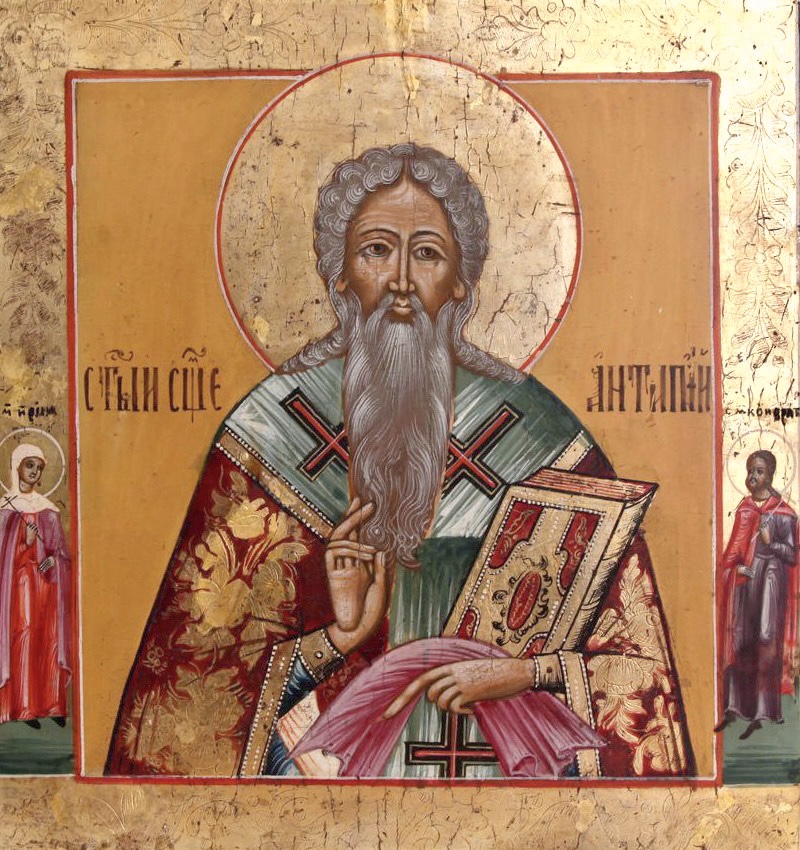Christ is Risen!
Matins of the Sunday of the Myrrh-Bearers is blessed with a fine canon, and it would be appropriate and spiritually beneficial to use it in our home prayer throughout this week.

Ode I, Irmos: Taking up the Song of Moses, O my soul, * cry aloud: * “A helper and a protector hath become unto me salvation. * My God, * whom I will glorify”.
Glory to Thee, Our God, Glory to Thee.
Thou wast crucified in the flesh, O Thou Who art passionless by the nature of the Father; and Thou was pierced in the side, thereby causing blood and water to spring forth for the world. Thou art our God, and we glorify Thee.
Glory to Thee, Our God, Glory to Thee.
I honour Thy Cross and I glorify Thy Burial, O Good One, and I praise and worship Thine Arising, and I cry out: Thou art our God and we glorify Thee.
Glory to Thee, Our God, Glory to Thee.
Though Thou didst taste of gall, O Thou Who art the sweetness of the Church, yet didst Thou cause incorruption to spring forth for us from Thy side. Thou art our God, and we glorify Thee.
Glory to Thee, Our God, Glory to Thee.
O Savior, Thou wast counted among the dead, Thou Who didst raise up the dead. Thou didst taste of corruption, though Thou didst in no wise know corruption. Thou art our God, and we glorify Thee.
Glory to Thee, Our God, Glory to Thee.
Let Sion rejoice, and let Heaven be glad; Christ is risen, having raised up the dead who chant: Thou art our God, and we glorify Thee.
Glory to Thee, Our God, Glory to Thee.
Having wrapped Thy Body with fine linen, O Christ, Joseph laid Thee, our Salvation, in a new sepulcher; and as God, Thou didst raise up the dead.
Glory to Thee, Our God, Glory to Thee.
Anticipating the dawn, the women beheld Christ, and cried unto the divine disciples: Truly Christ is risen; come and praise Him together with us.
Glory be to the Father, and to the Son, and to the Holy Spirit.
O all-holy Trinity, one Godhead, beginningless Unity: Father, Son, and Divine Spirit, save the world. Thou art our God, and we glorify Thee.
Now and ever, and unto the ages of ages. Amen.
Thou didst loose the ancient curse by thy womb, O modest one, by blossoming forth the Blessing for us, when thou didst give birth unto a Child. For He is God, though He weareth flesh.
Katavasia: It is the Day of Resurrection, * let us be radiant, O ye people; * Pascha, the Lord’s Pascha: * for from death to life, * and from earth to heaven, * Christ God hath brought us, * as we sing the song of victory
Ode III, Irmos: My mind hath not brought forth good fruit, * but do Thou show me to be fruitful * in Thy compassion O God, * Thou husbandman of all good things.
Glory to Thee, Our God, Glory to Thee.
When Thy palms were nailed to the Cross, O Jesus, Thou didst bring all the nations together out of error and didst call them unto knowledge of Thee, O Savior.
Glory to Thee, Our God, Glory to Thee.
The people of the Jews cried unto Pilate: Release unto us the villainous thief; away with the Sinless One, away with Him, crucify Him!
Glory to Thee, Our God, Glory to Thee.
When Thou wast crucified, O Christ, the light was darkened, the earth was shaken, and the many of the dead arose from the grave out of fear of Thy power.
Glory to Thee, Our God, Glory to Thee.
As she stood at the Cross, Thine ewe-lamb cried out lamenting, O Jesus: Whither goest Thou, my Son? Whither dost Thou depart, O Lamb, Who art slain on behalf of all?
Glory to Thee, Our God, Glory to Thee.
I worship Thy Cross, I praise Thy Burial, I honour Thy Passion, and the nails in Thy hands, and the lance, and Thy Resurrection, O Jesus.
Glory to Thee, Our God, Glory to Thee.
Thou art arisen, O Jesus, the enemy is despoiled, Adam is delivered together with Eve from the bonds of corruption by Thy Resurrection.
Glory to Thee, Our God, Glory to Thee.
When Thou didst arise, O Christ, the bars were shattered, and the gates of Hades and the bonds of death were straightway rent asunder out of fear of Thy power.
Glory to Thee, Our God, Glory to Thee.
O God-receiving Joseph, come and stand with us, and cry: Risen is Jesus the Redeemer, Who in His compassion hath raised up Adam.
Glory to Thee, Our God, Glory to Thee.
Let the choir of the twelve disciples rejoice with us, together with the myrrhbearing women and Joseph, and the other disciples and women disciples of Christ.
Glory be to the Father, and to the Son, and to the Holy Spirit.
I worship and praise the one Nature: the Father, the Son and the Upright Spirit, divided in Hypostases and united in Essence.
Now and ever, and unto the ages of ages. Amen.
Blessed art thou, O pure one, who art of the root of Jesse, and from whom Christ, the Rod and Blossom, blossomed forth in the flesh for us.
Katavasia: Come, let us drink a new drink, * not one miraculously brought forth from a barren rock * but the Fountain of Incorruption, * springing forth from the tomb of Christ, * in Whom we are strengthened.
Lord, have mercy. Lord, have mercy. Lord, have mercy.
Sessional Hymn, Tone II: The women brought myrrh * and came unto Thy sepulcher. * Their souls filled with joy * on seeing the bright Angel’s light. * With great zeal and boldness, O Lord, they preached that Thou art the God of all, * and to Thy disciples they cried: ** The Life of all hath arisen from the dead.
Glory be to the Father, and to the Son, and to the Holy Spirit; now and ever, and unto the ages of ages. Amen.
Tone II: The choir of Thy disciples rejoice with one voice together * with the myrrhbearing women, * for they celebrate a common feast with them, * unto the glory and honour of Thy Resurrection; * and through them we cry to Thee: ** O Lord and Lover of mankind, grant great mercy unto Thy people.
Ode IV, Irmos: The prophet foreseeing Thy birth from a virgin, * prophesied crying aloud: * “I have heard report of Thee, and I was afraid; * For from the South, from the Overshadowed mountain * shalt thou come forth O Christ”
Glory to Thee, Our God, Glory to Thee.
By the Cross Thou didst bind the belly of Hades, and didst raise up the dead together with Thyself, and didst destroy the tyranny of death. Wherefore, we who are of Adam worship and praise Thy burial and arising, O Christ.
Glory to Thee, Our God, Glory to Thee.
O our Savior, Whose good pleasure it was, for the sake of Thy compassionate mercy to be nailed to the Cross and redeem us from the paternal curse, loose the bonds of my many transgressions, for Thou art able to accomplish whatsoever Thou dost will.
Glory to Thee, Our God, Glory to Thee.
O Thou Who didst nail to the Cross mine ancient curse, and didst cause blessing to pour forth for me from Thy side by Thy blood, O Savior, loose Thou the bonds of my many transgressions, for Thou art able to accomplish whatsoever Thou dost will.
Glory to Thee, Our God, Glory to Thee.
When hades met Thee in the nethermost regions, it was embittered, O Savior, seeing those whom it had the power to devour aforetime, now given up involuntarily; and its depths searched out, stripped, and despoiled of its dead.
Glory to Thee, Our God, Glory to Thee.
Though the stone was sealed, and the sentry was present, O ye lawless foes, yet the Lord arose as He foretold, loosing the bonds of my many transgressions, for He is able to accomplish whatsoever He doth will.
Glory to Thee, Our God, Glory to Thee.
O Thou Who didst arise from the sepulcher and didst despoil Hades and quicken the dead, and didst cause incorruption to flow forth for me by Thine arising, loose Thou the bonds of my many transgressions, for Thou art able to accomplish whatsoever Thou dost will.
Glory to Thee, Our God, Glory to Thee.
Truly ye have been put to shame, ye lawless ones; for Christ is risen and hath raised up the dead together with Himself, crying: Take courage, I have conquered the world. Be ye therefore convinced by Him or be ye silent, ye deceivers, who set at naught His Resurrection.
Glory to Thee, Our God, Glory to Thee.
O Thou Who didst call unto the myrrh-bearers: Rejoice, when Thou didst arise from the grave, O Good One, and unto the Apostles: Proclaim Mine arising; loose Thou the bonds of my many transgressions, for Thou art able to accomplish whatsoever Thou dost will.
Glory to Thee, Our God, Glory to Thee.
Let us honour the noble Joseph, the zealot of piety, the counselor and disciple, together with the myrrh-bearers and the apostles, while crying out together with them and radiantly praising the Savior’s Resurrection with faith.
Glory be to the Father, and to the Son, and to the Holy Spirit.
Who can tell of the immeasurable glory of the Godhead, transcendent in essence? for being the Trinity by nature, He is praised as beginningless and consubstantial, and is hymned as a Unity in Trinity, in simple hypostases.
Now and ever, and unto the ages of ages. Amen.
Do thou unceasingly entreat Him Who dwelt in thy womb, O pure Virgin Mother, and Whom thou, the Theotokos, didst bear without knowing a man, that He loose the bonds of my many transgressions; for thou art able to help in whatsoever thou dost will.
Katavasia: On divine watch * let the God-inspired Habakkuk stand with us, * and show forth the light-bearing angel * clearly saying: * Today salvation is come to the world, * for Christ is risen as Almighty.
Ode V, Irmos: Having dispelled the gloom of my soul, * O my Savior, do Thou illumine me * with the light of Thy commandments * for Thou alone art the King of peace.
Glory to Thee, Our God, Glory to Thee.
When Thou wast clothed with me, Thou didst divest me of mine ancient garment which, alas! the sower of sin wove for me, O Savior.
Glory to Thee, Our God, Glory to Thee.
Alas! my sin hath sewn fig leaves for me who by the counsel of the serpent have not kept Thine immaculate commandment, O Savior.
Glory to Thee, Our God, Glory to Thee.
Though my soul was wounded by my thieving thoughts; Christ, Who came forth from Mary, hath healed it, by pouring oil thereon.
Glory to Thee, Our God, Glory to Thee.
Standing by the Cross, the most pure Theotokos called out with a maternal voice: Thou hast left me alone, O my Son and God.
Glory to Thee, Our God, Glory to Thee.
By the weapon of Thy Cross Thou hast put down the serpent, the author of evil, and by Thine arising Thou hast broken the sting of death, O Jesus.
Glory to Thee, Our God, Glory to Thee.
Let Adam also cry out: O Death, where is thy sting? O Hades, where is thy victory? Thou art destroyed by the quickening of Him that raiseth the dead.
Glory to Thee, Our God, Glory to Thee.
The myrrhbearing women, on reaching the sepulcher of Him that quickeneth them that are below, heard a voice saying: Christ is risen.
Glory to Thee, Our God, Glory to Thee.
While celebrating the memory of the pious myrrh-bearers and of all Thy disciples on thy radiant arising, we praise Thee, O Christ.
Glory to Thee, Our God, Glory to Thee
As is meet, let us all honor the noble Joseph, who took down the Body of the Lord from the Tree and faithfully buried it.
Glory be to the Father, and to the Son, and to the Holy Spirit.
Thee, the God and Father, and the Son and the Spirit, do I worship, in three hypostases, and I believe the One to be Three, in one essence.
Now and ever, and unto the ages of ages. Amen.
We the faithful praise thee, who by a seedless conception didst give birth in a manner transcending nature, to Christ, the only Master, Who hath renewed nature.
Katavasia: Let us awake in the deep dawn, * and instead of myrrh, offer a hymn * to the Master, * and we shall see Christ, the Sun of Righteousness, * Who causeth life to dawn for all.
Ode VI, Irmos: I am held fast in the depths of sin O Savior, * and am overwhelmed by the sea of life, * but as Jonah was delivered from the sea-monster, * so also deliver me from the passions, * and save me.
Glory to Thee, Our God, Glory to Thee.
Hades is dead, take courage, O ye earthborn, for while Christ was hanging upon the Tree, He struck the sword against him, and he lieth dead; for, being stripped naked, he was despoiled of those he held.
Glory to Thee, Our God, Glory to Thee.
Hades hath been despoiled, take courage, O ye dead; and the tombs have been opened: arise. Thus did Christ cry unto you from Hades, as One Who hath come to deliver all from death and corruption.
Glory to Thee, Our God, Glory to Thee.
The dead, which at one time thou didst have the power to devour, and which now are demanded of thee, do thou give back to Me, O Hades, crieth God, the Giver of life, Who hath come to deliver all from thine insatiate belly.
Glory to Thee, Our God, Glory to Thee.
O ye myrrh-bearing women, why hasten ye now? Why bring ye myrrh unto the Living One? Christ is risen, as He foretold. Let your tears cease and be changed into joy.
Glory to Thee, Our God, Glory to Thee.
Having wrapped Thee in linen, O Christ, the noble Joseph laid Thee in a tomb; and having anointed with myrrh the fallen temple of Thy Body, he rolled a great stone before the sepulcher.
Glory to Thee, Our God, Glory to Thee.
The Lord is risen and hath despoiled the enemy, and having plucked out them that were in fetters, He hath led them all forth, as well as Adam the first-fashioned, when He raised them up, since He is compassionate and the Lover of mankind.
Glory be to the Father, and to the Son, and to the Holy Spirit.
O ye faithful, let us praise the Trinity in Unity, glorifying the Father with the Son, and the Spirit Who is consubstantial with the Son, and Who with the Father is co-beginningless and everlasting God.
Now and ever, and unto the ages of ages. Amen.
Like a vineyard didst thou conceive untilled in thy womb the Cluster of grapes wherefrom, like wine, there pour forth for us torrents of immortality, even eternal life.
Katavasia: Thou didst descend into * the nethermost parts of the earth, * and didst shatter the eternal bars * that held the fettered, O Christ, * and on the third day, * like Jonah from the whale, * Thou didst arise from the tomb.
Lord, have mercy. Lord, have mercy. Lord, have mercy.
Glory be to the Father, and to the Son, and to the Holy Spirit; now and ever, and unto the ages of ages. Amen.
Kontakion, Tone II: When Thou didst cry, Rejoice, unto the Myrrh-bearers, * Thou didst make the lamentation of Eve the first mother * to cease by Thy Resurrection, O Christ God. * And Thou didst bid Thine apostles to preach: ** The Savior is risen from the grave.
Ikos: As the Myrrh-bearers went to Thy tomb, O Savior, they were perplexed in mind and said to themselves: Who will roll the stone away from the sepulcher for us? And looking up, they saw that the stone was rolled away. They were awestruck by the form of the angel and his raiment. They were taken with trembling and thought to flee; and the youth cried unto them: Be not afraid; He Whom ye seek is risen; come, behold the place where the body of Jesus lay, and go quickly, proclaim unto the disciples: The Savior is risen from the grave.
Ode VII, Irmos: Like unto the cherubim, the children rejoicing in the furnace sang: * “Blessed art Thou O God, * for in truth Thou hast brought this judgment upon us * because of our sins, * Thou art supremely praised and glorified throughout all ages”.
Glory to Thee, Our God, Glory to Thee.
Thou, as the Lover of mankind, wishing to save from error all whom Thou hadst fashioned, didst deign to be nailed to the Cross, that by Thy flesh Thou mightest renew this image demolished by the passions, O Savior; and despoiling Hades, Thou didst raise up the dead with Thyself.
Glory to Thee, Our God, Glory to Thee.
When Thou wast lifted up upon the Cross, O Compassionate One, Thou didst call all unto Thyself, as Thou didst promise, O Good One. For in truth Thou wast pleased to suffer all these things because of our sins. Wherefore, Thou didst also open the gates of Paradise unto the thief, O Savior.
Glory to Thee, Our God, Glory to Thee.
Thou didst raise up the fallen temple of Thy Body from the grave on the third day, as Thou didst promise, O Good One, that in truth Thou mightest make known Thy glory which Thou dost cause to flow for us through faith; and thou didst take away those who were in bonds, whom Hades had held of old in fetters.
Glory to Thee, Our God, Glory to Thee.
O mindlessness of the Jews! O frenzy of the lawless! What thing did ye see, that ye believed not in Christ? For did He not by a word raise up the sick? Or did He not Himself save the whole world? At least, let the soldiers or those that arose from the dead convince you.
Glory to Thee, Our God, Glory to Thee.
Let the guards who became as dead now say: How was He stolen, Whom the ungrateful ones in no wise saw? For if they saw Him not arisen, how would they ever have perceived how He was stolen? At least, let this stone and Christ’s funeral shrouds convince you.
Glory to Thee, Our God, Glory to Thee.
Whom do ye guard as dead? What seals have ye placed upon the stone, O ye Jews, who fear the fear of theft? Behold, in truth the grave is sealed. How, therefore, did He arise, were Christ not God? * Let them that arose and were seen by many convince you.
Glory be to the Father, and to the Son, and to the Holy Spirit.
With the Father we glorify the Son and the Holy Spirit, crying with unceasing voice: O Trinity, single essence, have mercy, save us all, Thou Who art a Unity in three Hypostases; have compassion on us, O God, Who art glorified unto the ages.
Now and ever, and unto the ages of ages. Amen.
O most pure One, how, except in a manner as He willed and as He knew, didst thou contain in thy womb a Child before Whom the hosts of angels tremble, since He is God? He dwelt among us, wishing to save all the earthborn of Adam and to loose Adam from that curse which came from the bitter tasting.
Katavasia: He Who delivered the Children from the furnace, * became man, suffereth as a mortal, * and through His Passion * doth clothe mortality with the beauty of incorruption, * He is the only blessed and most glorious * God of our fathers.
Ode VIII, Irmos: Unto Him Who of old prefigured the miracle of the Virgin, * unto Moses in the burning-bush * on Mount Sinai, * let us sing, bless and supremely exult throughout all ages.
Glory to Thee, Our God, Glory to Thee.
The beams of the sun withdrew themselves in fear before the sufferings of Christ, and the dead arose, and the mountains shook, and the earth trembled, and Hades was laid bare.
Glory to Thee, Our God, Glory to Thee.
The thrice-blessed Children who were in the furnace of old, raising up their hands, prefigured Thine immaculate Cross, O Good One, whereby Thou didst cast down the might of the enemy, O Christ.
Glory to Thee, Our God, Glory to Thee.
O ye blind Jews, deceivers and transgressors, who disbelieved Christ’s arising as though it were a lie: What do ye see that is unbelievable? that Christ, Who raised up the dead, is risen?
Glory to Thee, Our God, Glory to Thee.
Who is it that withered the fig tree? Who is it that healed the withered hand? Who is it that once filled the multitude in the wilderness? Is it not Christ God, Who raised up the dead?
Glory to Thee, Our God, Glory to Thee.
Who is it that raised from the grave, the man four-days dead, and the son of the widow? Who is it that, as God, strengthened the paralytic on his bed? Is it not Christ God, Who raised up the dead?
Glory to Thee, Our God, Glory to Thee.
The stone itself crieth, the seals call out; when ye placed them, ye appointed a watch to guard the tomb. Truly Christ is risen, and He liveth throughout the ages.
Let us bless Father, Son, Holy Spirit, the Lord!
We glorify the Son and the Holy Spirit together with the Father, even the Holy Trinity in one Godhead and we cry: Holy, Holy, Holy art Thou throughout the ages.
Now and ever, and unto the ages of ages. Amen.
Without suffering change, thou didst give birth unto One, even Christ God, Who is twofold of nature, Who, as the ever-living Bread, was fashioned without fashioning in thy womb, according to our fashion.
Katavasia: This chosen and holy day * is the first of the Sabbaths, * the queen and lady, feast of feasts, * and the festival of festivals, * wherein we bless Christ throughout the ages.
Ode IX, Irmos: In a manner surpassing nature * hath the Word who timelessly shone forth from the Father, * been conceived within a womb, * according to the flesh, * O ye faithful with never silent hymns let us magnify Him.
Glory to Thee, Our God, Glory to Thee.
When the thief recognized Thee as God upon the Cross, Thou didst make him an heir of the noetic Paradise, as he cried out: Remember me, O Almighty Savior.
Glory to Thee, Our God, Glory to Thee.
Thou wast smitten for our sake, Thou wast spat upon by the lawless men, O Jesus, Who didst inscribe the tablets of the Law on Mount Sinai for Thy servant Moses.
Glory to Thee, Our God, Glory to Thee.
Thou was pierced in Thy life-creating side, O Christ, and Thou didst cause Thine immaculate Blood and the precious Water to flow forth as an ever-living fount for the world.
Glory to Thee, Our God, Glory to Thee.
Thou wast accounted among the dead, O Thou Who didst quicken the dead; Thou wast laid in a grave, Who didst empty the graves; Thou didst despoil Hades, O Thou Who didst resurrect Adam.
Glory to Thee, Our God, Glory to Thee.
Glory be to Thee, O Christ Savior, Who didst cause life to flow forth, and the light to shine upon those in the darkness of ignorance, and Who hast illumined the whole world by Thine arising.
Glory to Thee, Our God, Glory to Thee.
Let us acclaim the wondrous Joseph, as well as Nicodemus and the faithful Myrrh-bearers, O ye faithful, as we cry out: The Lord is truly risen.
Glory be to the Father, and to the Son, and to the Holy Spirit.
Thou art beginningless, O Father; uncreated art Thou, O Son; of equal rank is the Spirit; the Three being One by nature and Three in Hypostases, even one true God.
Now and ever, and unto the ages of ages. Amen.
Let Jesse rejoice and let David dance, for behold, the Virgin, the rod planted by God, hath blossomed forth the Flower, even the everlasting Christ.
Katavasia: Shine, shine, O new Jerusalem, * for the glory of the Lord hath arisen upon thee; * dance now and be glad, O Zion, * and do thou exult, O pure Theotokos, * in the arising of Him Whom thou didst bear.
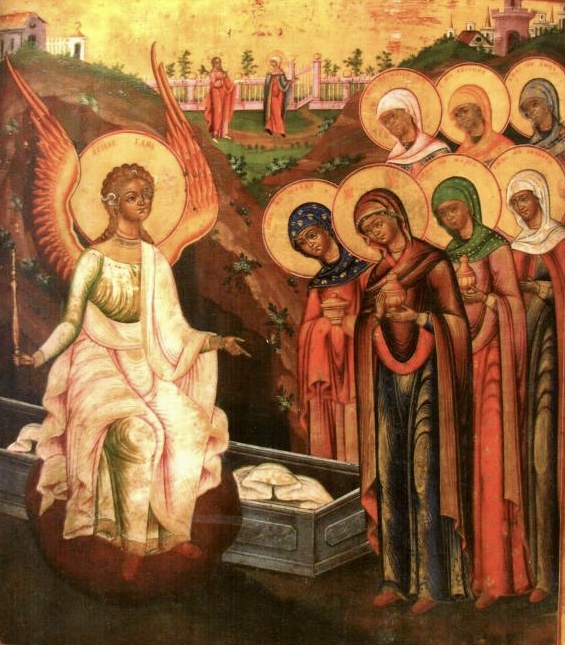
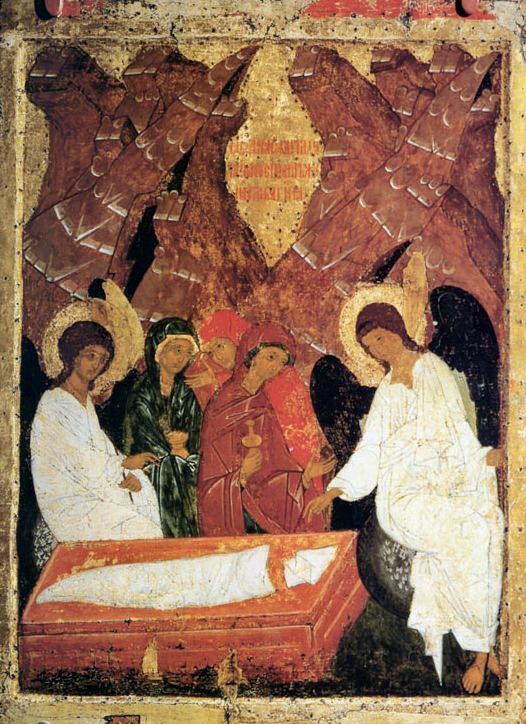 They had every excuse to be confused, fearful, anxious, enveloped in mental, spiritual darkness, but what of us, who have just celebrated the Saviour’s Victory over hell and death?
They had every excuse to be confused, fearful, anxious, enveloped in mental, spiritual darkness, but what of us, who have just celebrated the Saviour’s Victory over hell and death?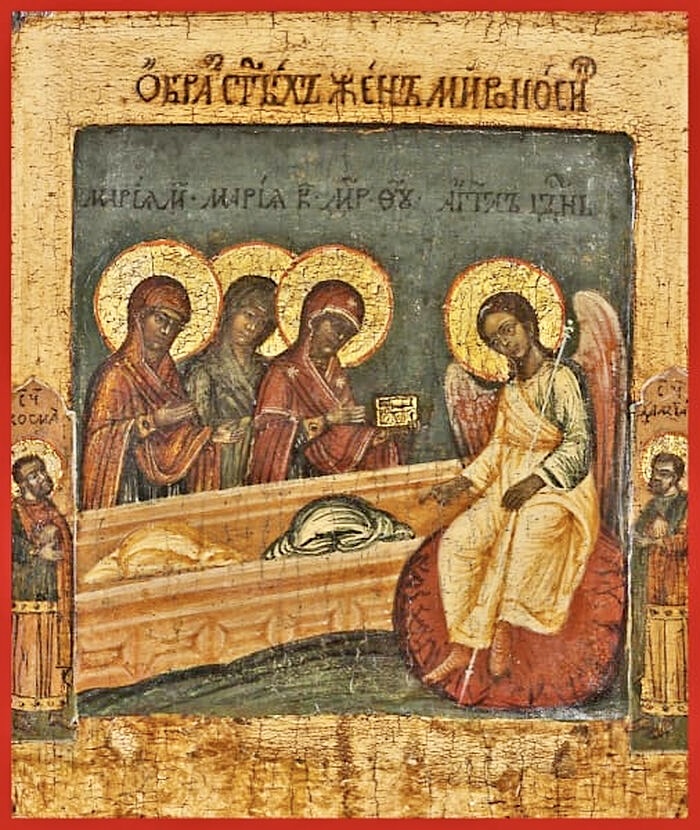
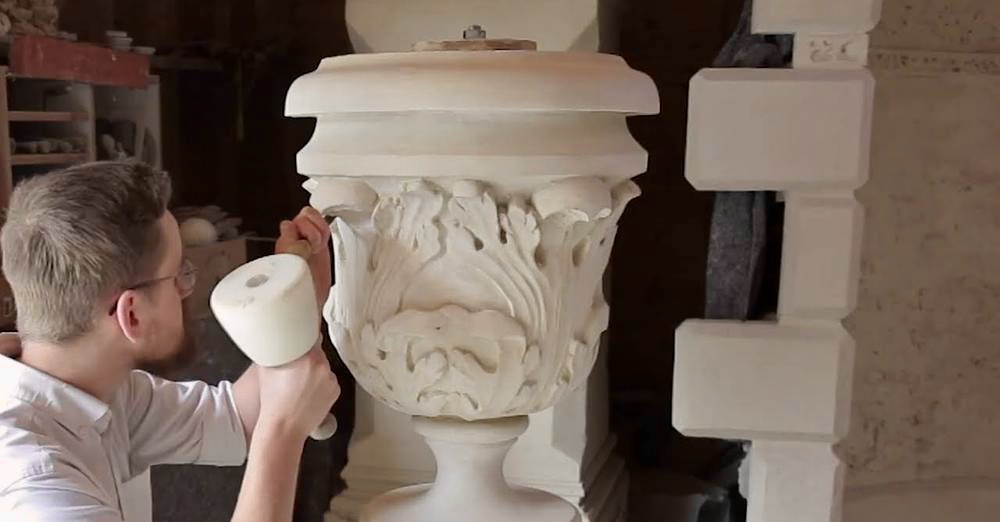
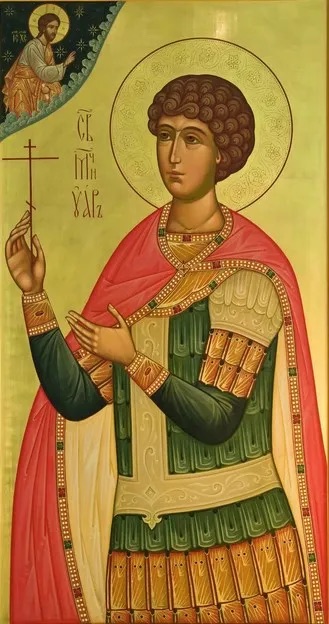 It happened that there were seven teachers of the Christians, desert-dwellers, that were brought before the Prince of Egypt.
It happened that there were seven teachers of the Christians, desert-dwellers, that were brought before the Prince of Egypt.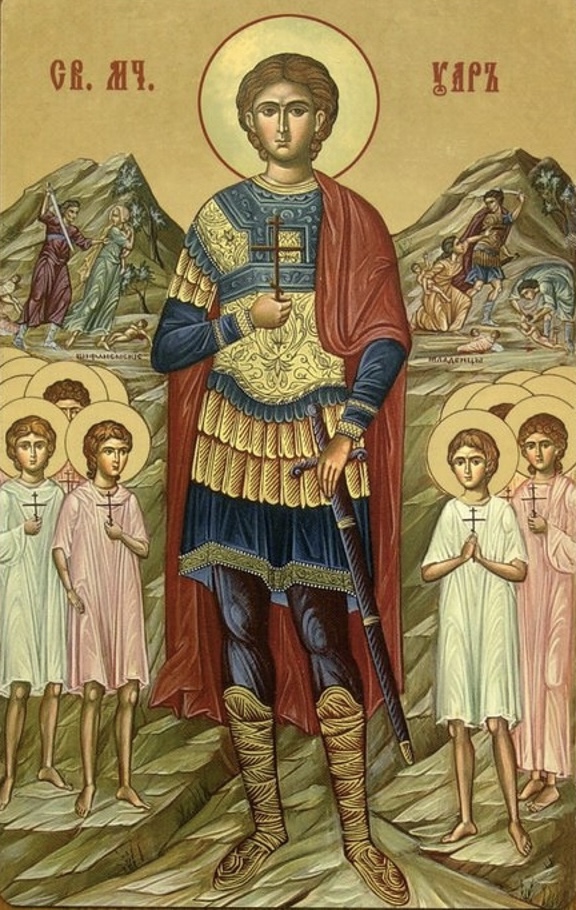
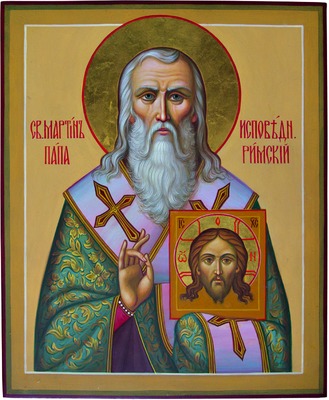 At this time the peace of the Church was disturbed by the Monothelite heresy (the false doctrine that in Christ there is only one will. He has a divine, and a human will). The endless disputes of the Monothelites with the Orthodox took place in all levels of the population. Even the emperor Constans (641-668) and Patriarch Paul of Constantinople (641-654) were adherents of the Monothelite heresy. The emperor Constans II published the heretical “Pattern of Faith” (Typos), obligatory for all the population. In it all further disputes were forbidden.
At this time the peace of the Church was disturbed by the Monothelite heresy (the false doctrine that in Christ there is only one will. He has a divine, and a human will). The endless disputes of the Monothelites with the Orthodox took place in all levels of the population. Even the emperor Constans (641-668) and Patriarch Paul of Constantinople (641-654) were adherents of the Monothelite heresy. The emperor Constans II published the heretical “Pattern of Faith” (Typos), obligatory for all the population. In it all further disputes were forbidden.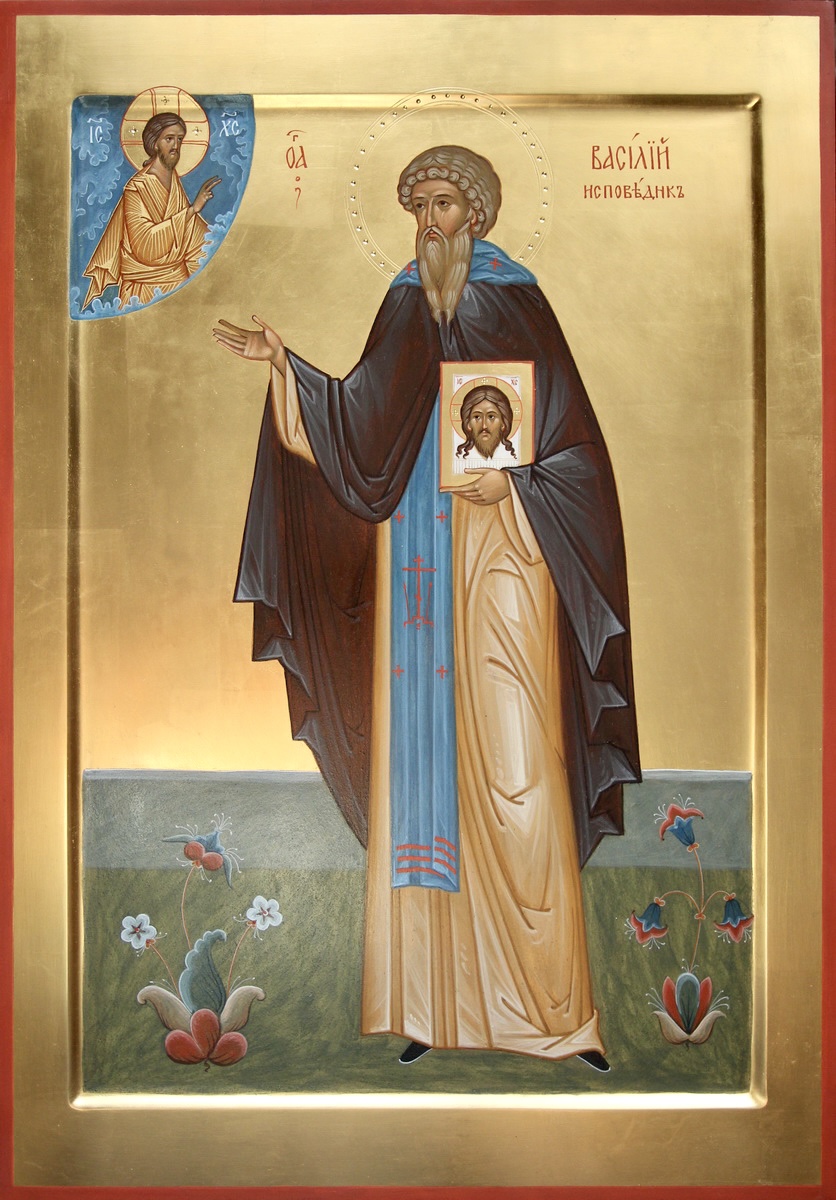

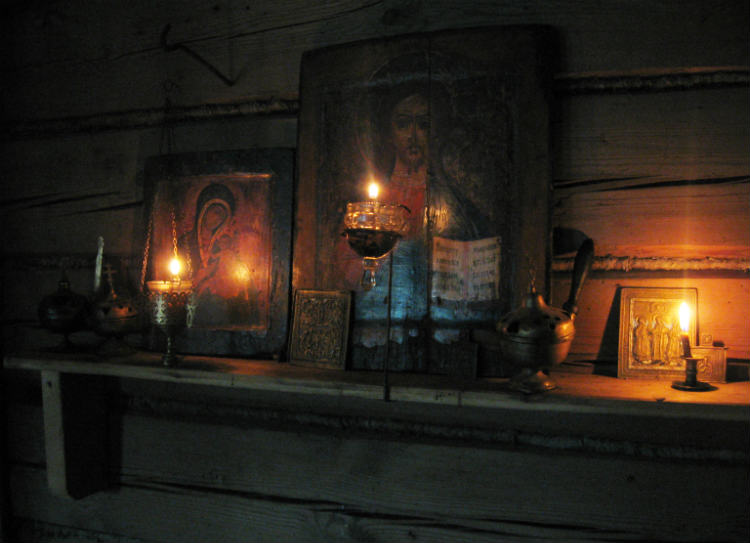
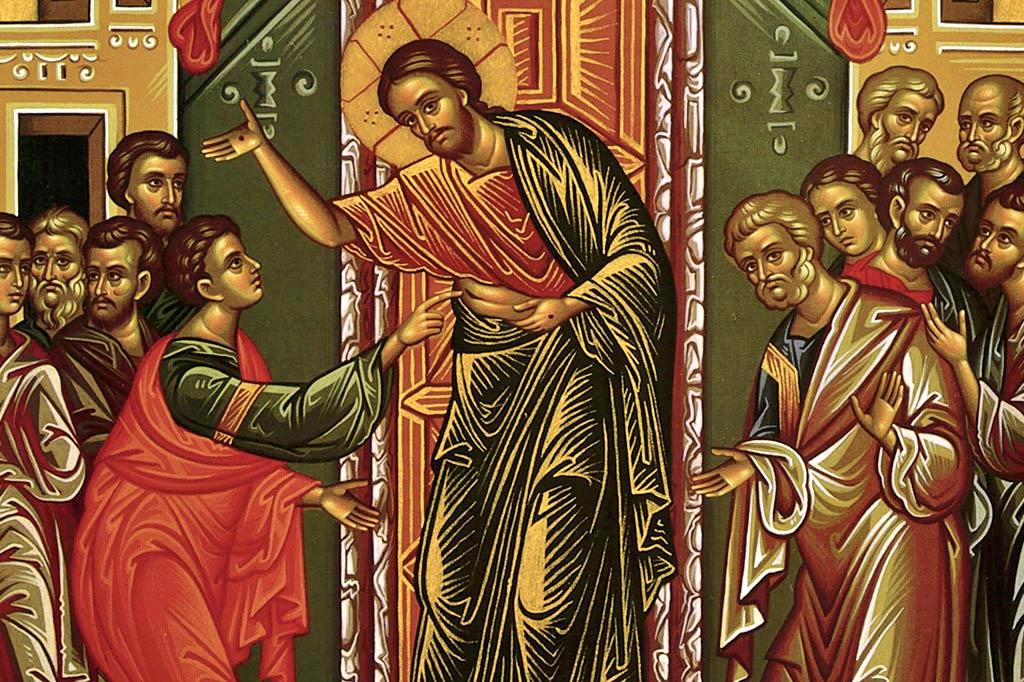 In the Name of the Father, and of the Son, and of the Holy Spirit.
In the Name of the Father, and of the Son, and of the Holy Spirit.